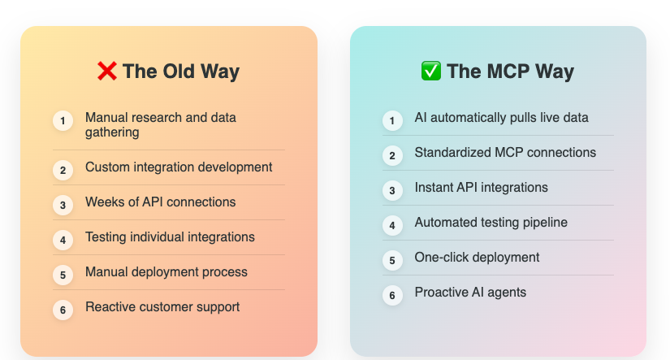Medium
1d
155

Image Credit: Medium
MCP: Because Your AI Shouldn’t Need a Babysitter in 2025
- Model Context Protocol (MCP) is an open protocol enabling AI to interact with external tools and data in real time, revolutionizing AI capabilities.
- MCP acts as a universal translator for AI, connecting AI models like large language models (LLMs) to real-world applications.
- It standardizes the way AI interacts with external systems, eliminating the need for bespoke integrations and custom coding.
- MCP facilitates real-time actions, enabling AI to access live data and systems for faster processing.
- For product managers and AI enthusiasts, MCP is a game-changer, allowing AI to go beyond talk to action.
- By 2026, 70% of enterprise workflows are projected to involve AI agents performing tasks traditionally done by humans, with MCP playing a crucial role.
- MCP streamlines development cycles by simplifying integrations and accelerating product development.
- Product managers view MCP as a strategic tool for creating AI-powered products that are more proactive and responsive.
- In 2025, MCP is not just a buzzword but a competitive advantage shaping the future of AI-powered products.
- Companies leveraging MCP are at the forefront of the AI industry, transforming the way products are built and ecosystems of intelligence are shaped.
- MCP is compared to the importance of APIs in 2010 and the internet in 1999, emphasizing its significance in the evolution of AI technologies.
- In a world moving towards autonomous AI agents, MCP empowers AI to be a proactive problem solver and solution activator.
- MCP signifies a shift towards embedding intelligence into product strategies and staying ahead in the AI race.
- MCP enables AI to act swiftly, making it a valuable asset for solving complex problems and enhancing product strategies.
- The future favors those who integrate intelligence into their products, and MCP is key in making AI more actionable and effective.
- MCP encourages individuals to embrace AI's potential and leverage its capabilities to drive innovation and success in various domains.
Read Full Article
9 Likes
For uninterrupted reading, download the app